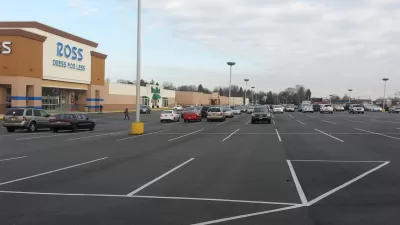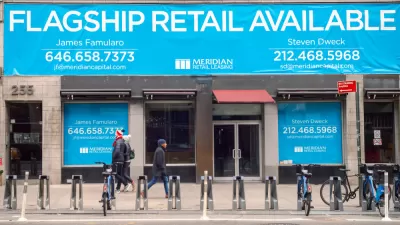As brick and mortar retailers shed jobs and stores, suburbs will lose the most in terms of tax revenues and amenities.

"It has been a decade since the media declared the death of the mall, in a year that would be the first in a half-century that no new malls were built in America," Henry Garbar writes for Slate. The closings have been widespread and deep. "The Limited, a women’s clothing store, shut down 250 stores and laid off 4,000 workers earlier this year. Sears Holdings will close 150 stores, including 108 Kmarts, and Macy’s will close another 100," Garbar reports.
This constriction of retail will affect suburbs more profoundly than it will affect cities, Garbar argues, and to understand why, you have to understand why malls moved to suburbs in the first place. Malls offered tax incentives and cheap land for large projects. This happened when retail was relatively robust. Now that there are fewer stores to go around, the competition will only become more fearsome."As shopping centers fold, developers of would-be projects will gain more power relative to suburban municipalities that already compete tooth-and-nail to steal each other’s business," Garbar writes. The result will be a race to the bottom and suburbs will be squeezed, whether or not they can accommodate these malls. To survive, Garbar opines, they'll have to look for new solutions.
FULL STORY: The Retail Apocalypse Is Suburban

Planetizen Federal Action Tracker
A weekly monitor of how Trump’s orders and actions are impacting planners and planning in America.

Maui's Vacation Rental Debate Turns Ugly
Verbal attacks, misinformation campaigns and fistfights plague a high-stakes debate to convert thousands of vacation rentals into long-term housing.

Restaurant Patios Were a Pandemic Win — Why Were They so Hard to Keep?
Social distancing requirements and changes in travel patterns prompted cities to pilot new uses for street and sidewalk space. Then it got complicated.

In California Battle of Housing vs. Environment, Housing Just Won
A new state law significantly limits the power of CEQA, an environmental review law that served as a powerful tool for blocking new development.

Boulder Eliminates Parking Minimums Citywide
Officials estimate the cost of building a single underground parking space at up to $100,000.

Orange County, Florida Adopts Largest US “Sprawl Repair” Code
The ‘Orange Code’ seeks to rectify decades of sprawl-inducing, car-oriented development.
Urban Design for Planners 1: Software Tools
This six-course series explores essential urban design concepts using open source software and equips planners with the tools they need to participate fully in the urban design process.
Planning for Universal Design
Learn the tools for implementing Universal Design in planning regulations.
Heyer Gruel & Associates PA
JM Goldson LLC
Custer County Colorado
City of Camden Redevelopment Agency
City of Astoria
Transportation Research & Education Center (TREC) at Portland State University
Jefferson Parish Government
Camden Redevelopment Agency
City of Claremont




























